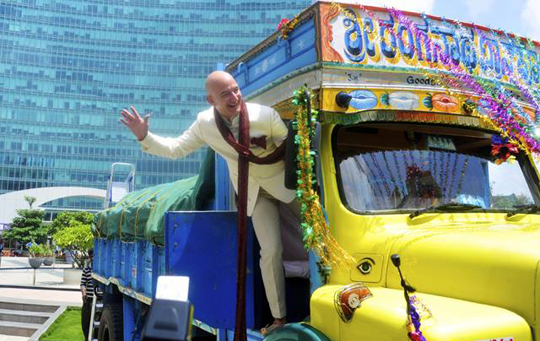
Bangalore, Sep 29: India has surpassed the highest expectations for Amazon, the company's founder and CEO Jeff Bezos said, promising to keep the money tap open for a business that he announced has sold goods worth more than $1 billion (Rs 6,000 crore) in just over a year of operations.
"We had very high expectations and this team has blown past our highest expectations... It's going extraordinarily well," said Bezos, 50, who is making his second visit to India and his first after Amazon launched its India retail business in June 2013. "The results are very good. Now that's why we are doubling down our investments... If there is an opportunity to invest more, we will. We are not capital-constrained, we are ideas-constrained he said.
In July, Bezos committed to invest $2 billion in India, just a day after India's biggest online retailer Flipkart announced $1 billion in funding, setting the stage for a battle for top honours in a market that retail advisory Technopak expects to be worth $32 billion (Rs 1.9 lakh crore) by 2020.
With an estimated net worth of $30 billion, Bezos is one of the world's richest men and India is crucial to his plans for Amazon, given the country's size and potential, and especially since it has failed to make much headway in China.
Unfazed by Alibaba
His company launched relatively late in this country. Amazon's share price has fallen by around 20% on the Nasdaq this year, and China's Alibaba is flush with cash after its IPO and ready to challenge Bezos around the world, including India. But Bezos, who swears by the credo of long-term thinking, is unfazed.
"Judging just based on results, I would say we have come exactly at the right time," Bezos said in response to a question about whether he has left India until too late, and let out a full-throated guffaw, one of several that punctuated the 40-minute interview.
Amazon's main rivals in India are Bangalore-based Flipkart and Snapdeal, the Delhi-based company that counts eBay, Azim Premji and Ratan Tata as investors. Together, they have sold goods worth more than $4 billion, with Flipkart alone estimated to have crossed $2 billion. Alibaba, too, is keen on India, and the Chinese company has the money, experience and ambition to succeed here.
Does Alibaba's $25-billion IPO earlier this month put Bezos under added pressure? "If so, I haven't felt it," he said, bellowing once again with laughter and reiterating his focus on good business results over the long term.
Asked what was his message for Sachin Bansal and Binny Bansal of Flipkart (both former employees of Amazon India) especially after it appeared to have tauntingly welcomed him with giant billboards across Bangalore, including one outside the Sheraton hotel where he is staying, announcing its upcoming 'Big Billion Day' sale, Bezos refused to be drawn to speak about competition.
"I have this long-standing practice about not talking about other companies. We have a somewhat unusual or rather unique approach of mostly ignoring our competitors," he said.
With revenue of nearly $75 billion in 2013 and a market value of $150 billion, Amazon is best-known as an online retailer. But it also runs a fastgrowing cloud computing business called Amazon Web Services and makes Kindle tablets and Fire smartphones. Bezos, in his personal capacity, bought The Washington Post newspaper last year. In India, Amazon started its technology operation first and employs a total of about 12,000 staff at offices in Bangalore, Hyderabad, Chennai and Delhi.
Dressed casually in beige trousers and a light blue shirt, Bezos was unstinting in his praise for country head Amit Agarwal, whose team has made sure that India is the fastest country to reach $1 billion in gross sales for Amazon. "He is going to blush because I am going to say so many good things," Bezos at the start of the interview said about his former technical advisor at Seattle headquarters.
Some of the innovations by the India operation are being exported to the rest of the world, Bezos said, pointing to its 'Easy Ship' service of delivering goods for sellers who don't stock their products with Amazon.
"I am super excited," he said. Traditionally, Amazon has grown organically but it is open to acquisitions in India, Bezos said, as he spoke of the Indian operation along with AWS, Kindle and fashion as the company's new frontiers. "Mostly we grow organically and that's true in India. But if there are opportunities to do acquisitions, we'll always consider."
Asked whether India's marketplace-based e-retailing model was a bother - Amazon operates an inventory-based model at home - Bezos said his company had no issues whatsoever, dispelling a perception that the Indian system was an irritant and he would lobby with the government during this visit to change it. "Our marketplace model is working phenomenally well... I always tell my team that whatever the rules are, we are the ones who would have to adapt to the local rules," he said.
Some five years ago, Bezos made a quiet two-week visit to India, allocating the first half of his trip for business and rest for leisure. The father of four took his nine-year-old son to the main tourist attractions, including the Taj Mahal in Agra and Varanasi, a city now represented in the Lok Sabha by Prime Minister Narendra Modi.
"I find India and the people not just energetic but personally energising," he said.







Comments
Add new comment